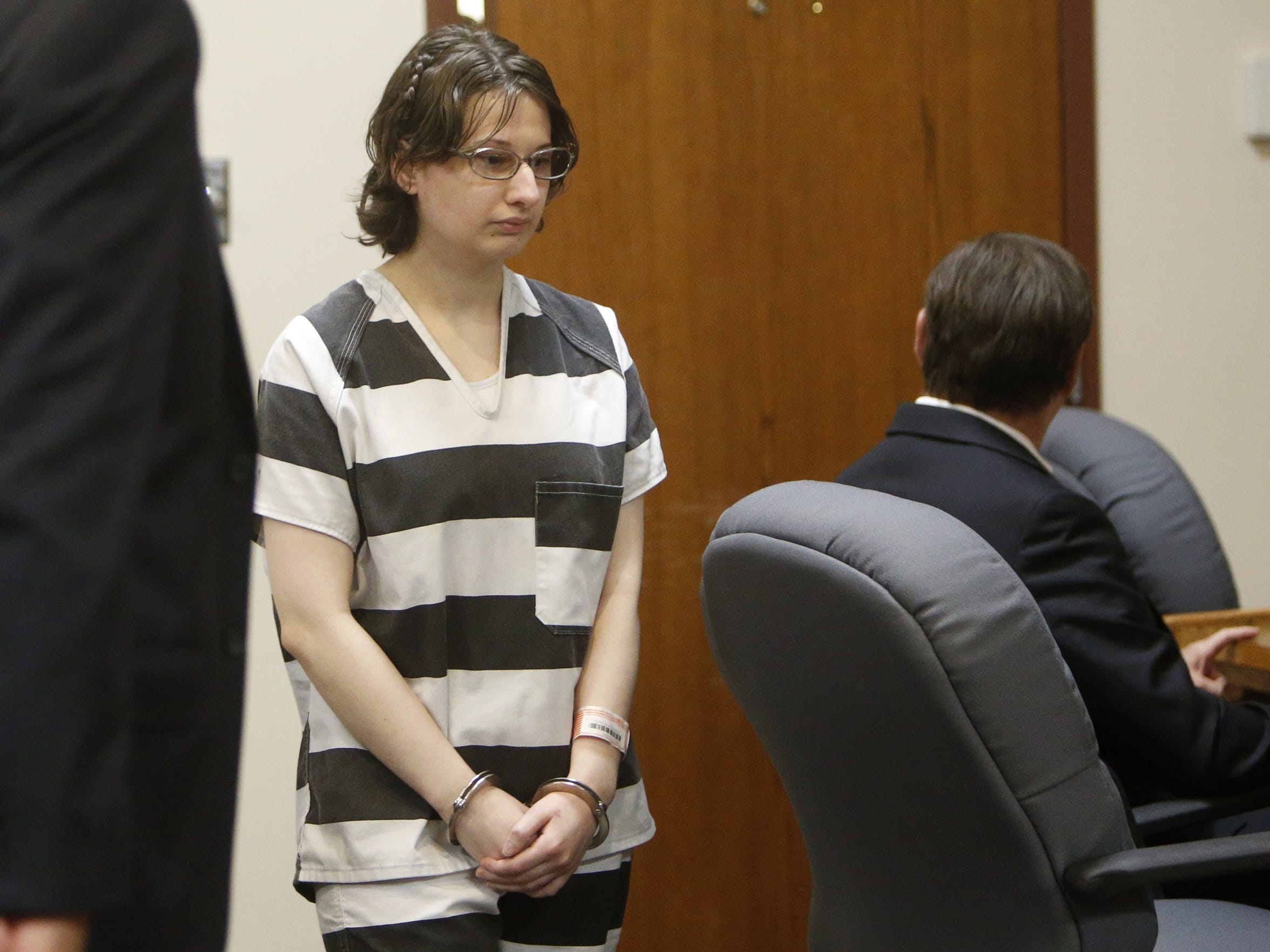Gypsy Rose Blanchard's Sentence: A Deep Dive Into The Shocking True Crime Story
True crime fans, gather 'round because we're about to dive deep into one of the most jaw-dropping cases of our time. Gypsy Rose Blanchard's sentence sent shockwaves through the legal world, and for good reason. This isn't just any ordinary case; it's a story filled with deception, manipulation, and a mother-daughter relationship that'll make your head spin. Brace yourself because we're about to unpack everything you need to know about Gypsy Rose Blanchard's sentence and the twisted events that led up to it.
Picture this: a young woman trapped in a life of lies, forced to play the role of a severely ill child while her mother reaped the rewards of sympathy and attention. Sounds like something outta a Lifetime movie, right? But it's 100% real, and Gypsy Rose Blanchard's story is one that will haunt you long after you finish reading. So, grab your favorite drink and get comfy because we're diving headfirst into this wild tale.
Now, before we get into the nitty-gritty details of Gypsy Rose Blanchard's sentence, let's set the stage. This isn't just about the legal outcome; it's about understanding the complex web of manipulation, abuse, and betrayal that defined her life. By the end of this article, you'll have a clearer picture of why Gypsy's sentence was so controversial and how it reflects the broader issues within the justice system. Let's go!
Table of Contents
Biography of Gypsy Rose Blanchard
Mother-Daughter Dynamics and Manipulation
Public Opinion and Media Coverage
Psychological Insights and Expert Analysis
The Long-Term Impact on Gypsy Rose
Biography of Gypsy Rose Blanchard
Gypsy Rose Blanchard's life reads like a script from a psychological thriller. Born on February 11, 1991, in Springfield, Missouri, Gypsy was raised by her mother, Debra Blanchard, who claimed she suffered from a range of severe medical conditions, including muscular dystrophy and leukemia. But here's the kicker: much of it was fabricated. Debra, or "Dee Dee" as she was known, had been diagnosed with Munchausen syndrome by proxy, a condition where caregivers intentionally harm or exaggerate a child's illness to gain attention and sympathy.
Early Life and Medical Diagnoses
From a young age, Gypsy was confined to a wheelchair, fed through a tube, and subjected to countless medical procedures. Her life was a carefully crafted illusion, with Dee Dee controlling every aspect of her existence. The extent of the deception was mind-blowing, with Gypsy even undergoing unnecessary surgeries and treatments. It's safe to say her childhood was anything but normal.
| Full Name | Gypsy Rose Blanchard |
|---|---|
| Date of Birth | February 11, 1991 |
| Place of Birth | Springfield, Missouri |
| Known For | Survivor of Munchausen syndrome by proxy; central figure in the true crime case involving her mother's murder |
What Was Gypsy Rose Sentence?
Alright, here's the big question everyone's been asking: what was Gypsy Rose Blanchard's sentence? After being convicted of second-degree murder for her role in the killing of her mother, Dee Dee Blanchard, Gypsy was sentenced to ten years in prison. Now, before you start thinking this is an open-and-shut case, let's remember the context. Gypsy was a victim of severe abuse and manipulation for most of her life, which raises some serious questions about her culpability and the fairness of her sentence.
Factors Influencing the Sentence
- Gypsy's mental health and the psychological impact of years of abuse were key factors considered by the court.
- Her role in the murder was seen as influenced by her controlling boyfriend, Nicholas Godejohn, who orchestrated the plan.
- The jury acknowledged that Gypsy was not the mastermind behind the crime but still found her guilty due to her involvement.
The Background of the Crime
Let's rewind to the events leading up to Dee Dee Blanchard's murder. Gypsy had been living a life of complete isolation, with her mother controlling every aspect of her existence. When she met Nicholas Godejohn online, it opened up a new world for her. For the first time, she felt like she had a chance at freedom. But freedom came at a price. Nicholas convinced Gypsy that the only way to escape her mother's control was to kill her. And tragically, they followed through on that plan.
The Murder
On June 9, 2015, Dee Dee Blanchard was found dead in her home, stabbed multiple times. Gypsy and Nicholas were quickly identified as suspects, and the truth about their twisted plan began to unravel. It was a shocking revelation that sent ripples through the community and beyond.
Mother-Daughter Dynamics and Manipulation
The relationship between Gypsy and her mother was anything but normal. Dee Dee's Munchausen syndrome by proxy turned their lives into a living nightmare. Gypsy was forced to play the role of a severely ill child, with her mother going to extreme lengths to maintain the illusion. This dynamic of manipulation and control is a crucial part of understanding why Gypsy made the choices she did.
Psychological Impact on Gypsy
Gypsy's mental health was severely impacted by years of abuse and manipulation. Experts have pointed out that her involvement in the murder was not a simple act of malice but rather a desperate attempt to escape a life of captivity. Understanding the psychological toll of her upbringing is essential to grasping the complexity of this case.
Legal Proceedings and Trial
The trial of Gypsy Rose Blanchard and Nicholas Godejohn was a media sensation, drawing attention from true crime enthusiasts around the world. The prosecution painted Gypsy as an active participant in the murder, while the defense argued that she was a victim of manipulation and abuse. The jury ultimately found her guilty, but the verdict was not without controversy.
Key Evidence
- Text messages between Gypsy and Nicholas detailing their plan to kill Dee Dee.
- Testimonies from medical professionals about Dee Dee's Munchausen syndrome by proxy.
- Psychological evaluations of Gypsy highlighting the impact of years of abuse on her decision-making.
Public Opinion and Media Coverage
Public opinion on Gypsy Rose Blanchard's case is deeply divided. Some view her as a victim of circumstance, while others believe she deserves every bit of her sentence. The media coverage of the case has been extensive, with documentaries, books, and even a hit TV series exploring the details of her life and the murder. But with every new piece of information, the public's perception continues to evolve.
Psychological Insights and Expert Analysis
Experts in the field of psychology have weighed in on Gypsy's case, offering insights into the complex dynamics at play. The concept of Stockholm syndrome has been discussed, with some suggesting that Gypsy's attachment to Nicholas was a result of her desperate need for freedom. Others point to the long-term effects of childhood trauma and how it can influence adult behavior.
Key Psychological Findings
- Gypsy exhibited signs of learned helplessness due to years of abuse.
- Her relationship with Nicholas was likely a manifestation of her desire for autonomy.
- The impact of Dee Dee's manipulation on Gypsy's mental health cannot be overstated.
The Long-Term Impact on Gypsy Rose
As Gypsy serves her sentence, the long-term impact of her case continues to unfold. Her story has sparked conversations about the treatment of victims within the justice system and the importance of understanding the psychological factors that influence criminal behavior. For Gypsy, the road to recovery will be long and challenging, but her case has already left a lasting mark on the world of true crime.
Critique of the Legal System
Gypsy's case raises important questions about the fairness of the legal system. Should victims of abuse be held to the same standards as those who commit crimes out of malice? How do we balance justice with compassion? These are tough questions that require thoughtful consideration. Critics argue that Gypsy's sentence doesn't fully account for the years of trauma she endured, while others believe the law must be upheld regardless of circumstances.
Conclusion and Final Thoughts
In conclusion, Gypsy Rose Blanchard's sentence is a complex issue that reflects the broader challenges within the justice system. While the legal outcome may not satisfy everyone, it's clear that her case has sparked important conversations about abuse, manipulation, and the treatment of victims. As we continue to unpack the details of her story, let's remember the humanity behind the headlines and the need for empathy in all our judgments.
So, what do you think? Should Gypsy's sentence be revisited? Or was justice served? Let us know in the comments below, and don't forget to share this article with your fellow true crime enthusiasts!
References and Sources
1. Netflix Documentary: "The Act"
2. CNN Article: "Gypsy Rose Blanchard Sentenced to 10 Years"
3. Psychology Today: "Understanding Munchausen Syndrome by Proxy"
4. True Crime Magazine: "The Untold Story of Gypsy Rose Blanchard"

Tim Branom Gypsy Rose

Tim Branom Gypsy Rose

Gypsy Rose Crime Cases Photos